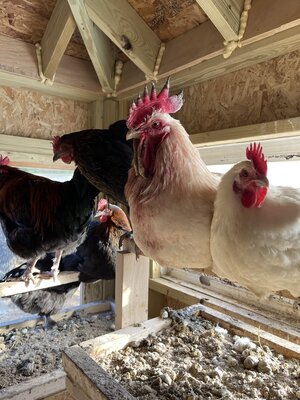tikibanjo
Chirping
Hello! I have two groups of birds (March 2020 and September 2020), and the alpha roo (a French Bresse) from the older batch suddenly, yesterday, was covered in blood from his wattle down his cape. I’m not aware of any predators. He is the largest bird by a decent margin - the other Roos his age are pretty submissive to him usually. No other birds were injured. Today (pic below) he looks a little “better” - at least, it looks like his wattle is healing. He’s been pretty beat up, though, and I’m wondering if there’s anything I can do to expedite his healing.
I realize that the younger birds are probably becoming more of a part of the pecking order as they’ve gotten nearly as big as the spring group, and maybe there was a fight? But I haven’t noticed anything. They seem to all get along fairly well when I’m around. (Back in October, I culled 6 roosters because they had gotten too aggressive - and were from a line that, I think, got too inbred. This Bresse was “next in line” in the pecking order...) Any suggestions would be much appreciated!
I realize that the younger birds are probably becoming more of a part of the pecking order as they’ve gotten nearly as big as the spring group, and maybe there was a fight? But I haven’t noticed anything. They seem to all get along fairly well when I’m around. (Back in October, I culled 6 roosters because they had gotten too aggressive - and were from a line that, I think, got too inbred. This Bresse was “next in line” in the pecking order...) Any suggestions would be much appreciated!





